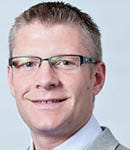Solid Waste Expert Offers Perspective on Landfills in New Role
A former area manager for Republic Services has joined Middletown, N.J.-based T&M Associates to lead its national solid waste services business. Chris Jaquet will provide the consulting and management company with advisory and technical services to help both public and private clients address their transfer, disposal, recycling, composting and recovery challenges. He will be based in T&M's Cleveland, Ohio office.
Jaquet holds a bachelor’s of science degree in civil engineering from Michigan Technological University and is a registered professional engineer in Michigan. He will offer clients a strong technical expertise paired with a thorough understanding of operations and financial risk management, as well as a broad background in landfill permitting, design, construction and quality assurance. He has a proven track record in maintaining compliance with strict regulatory requirements while meeting or exceeding goals for operational optimization for landfills ranging in size from 150 to 5,800 tons per day.
Waste360 recently say down with Jaquet to discuss his new role at T&M in providing economical and reliable solutions that will improve operational efficiency for its clients.
Waste360: How have landfills and waste changed or evolved during your tenure in the industry?
 Chris Jaquet: In my opinion, the industry has become much more educated and proactive. At every aspect it is understood that compliance and safety are number one! If they are not the consequences will far outweigh any short benefit received. I think this is fantastic and will only lead to more creative and beneficial ways to manage our waste as a society.
Chris Jaquet: In my opinion, the industry has become much more educated and proactive. At every aspect it is understood that compliance and safety are number one! If they are not the consequences will far outweigh any short benefit received. I think this is fantastic and will only lead to more creative and beneficial ways to manage our waste as a society.
Waste360: What are the biggest challenges facing landfill operations today?
Chris Jaquet: I believe the top four are efficiency, public relations, the evolving ton and stringent regulatory requirements.
As with every industry today, there is no room for wasteful spending. This requires landfill operators and consultants to track trends and model data more efficiently. This ranges from a more detailed evaluation of the gas system to make sure the gas to energy partnership is being optimized, to modeling the tons per hour and tons per type at the face to make sure the proper number and size equipment is being used, to assessing the makeup of the liner and cap systems to verify there isn’t a more effective option available. These are only a few of the many evaluations or models constantly being re-assessed to make sure the most efficient system is in place.
Many of today’s landfills were sited 30, 40, or 50 years ago out in the country. With urban sprawl and population growth most of these facilities are not so rural any more. That situation results in many operational challenges for today’s landfills. They are still a necessary part of our civilization, but not a part that anyone—including myself—wants to live beside. However, until we find another way to responsibly manage all of our waste we need to co-exist somehow.
As industries reduce pollution and we learn how to reuse more, the waste makeup at landfills is changing. Chemicals that previously went into the air or water are being captured and disposed of responsibly in lined facilities while metals, plastics, fiber and biodegradables are being removed from the waste stream. These are fantastic things that show we are progressing as a people. However, as we have seen at certain facilities, this has led to unexpected reactions, temperatures or settlement. This must be, and is, a constant focus of the industry.
Waste360: What are the challenges related to transfer, disposal, recycling, composting and recovery?
Chris Jaquet: Each of these can be talked about for hours. In the end I think they all come back to two questions: What is economically beneficial and what is environmentally responsible? In this second question I mean what is truly environmentally responsible, but that is another long debate. Over the past two years I think we have all seen many articles arguing these two points. I believe the biggest challenge facing those five items will be how the public decides to answer these questions and how industry can react to that answer.
Waste360: How will you and T&M tackle those challenges for clients?
Chris Jaquet: T&M is active in many industry and legislative groups. By remaining informed and at the leading edge of change we will be positioned to advise our clients on how they can best react to legislative change. By remaining proactive in permit updates and modifications it will allow our clients to be positioned to excel in their markets.
Waste360: What is your background in the landfill and waste industry?
Chris Jaquet: I began my career as a CQA technician running a density gauge and overseeing liner and gas system construction for three seasons. I then moved into the office to work on reports, construction plans and expansion permits for five years. In 2007, I accepted an environmental manager position with Allied Waste. When Republic merged with Allied in 2009, I was promoted to the area environmental manager for the Midwest, then in February I returned to consulting with T&M.
Waste360: What role will you play in optimizing operations for clients of T&M Associates?
Chris Jaquet: My goal is to bring the owner's perspective to T&M. T&M is a full service engineering firm with many experienced solid waste engineers. I want to leverage that experience with the owners operations, (return on investment), and long term planning thought process I gained while I was with Republic. In combining these two items we will be able to provide more complete and applicable solutions and meet all of our client’s needs.
About the Author
You May Also Like


.png?width=300&auto=webp&quality=80&disable=upscale)